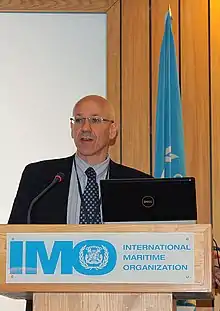
Neil Greenberg is an academic psychiatrist, who is a specialist in the understanding and management of psychological trauma, occupational mental ill-health and post traumatic stress disorder. Greenberg works with King's College London[1][2] and served as the President of the UK Psychological Trauma Society from 2014 to 2017.[3] He also runs the psychological health consultancy March on Stress.[4] During the 2020 COVID pandemic, Greenberg was part of the NHS England and Improvement Wellbeing Team and contributed to the national response to protect the mental health of NHS workers.[5]
Greenberg served in the UK Armed Forces for 23 years and during his service was part of the team to develop peer led traumatic stress support packages, most notably trauma risk management (TRiM),[6] for which he was awarded the Gilbert Blane Medal.[7]
Greenberg is a specialist in the field of trauma and mental health, and has published more than 350 scientific papers and book chapters.[1]
Some of his recent academic work includes writing extensively about protecting the mental health of NHS staff[8][9] and continuing to write about the mental health of employees more generally.[10] He has also published extensively of the use of trauma risk management including being the senior author of a paper published in the Journal of Occupational Medicine in May 2015.[11]
He has also led a comprehensive review paper published in the British Medical Bulletin on PTSD [12] and led a paper published in the Journal of Mental Health in 2015 which examined the potential mental health consequences for Ebola workers in West Africa.[13]
He regularly provides commentary in the media on the subjects of mental health, trauma and post traumatic stress disorder.[14][15][16][17][18]
He is also a lead advisor to UK charity Hostage UK[19] and is a trustee with the Society of Occupational Medicine[20] and the Faculty of Occupational Medicine[21]
Greenberg is the Royal College of Psychiatrists Lead for Trauma and the Military[22] and was shortlisted for the Royal College of Psychiatrists, psychiatrist of the year 2015.[23] The mental health team he led, which provided mental health support for the London Nightingale Hospital in 2020 during the Covid pandemic, won the Royal College of Psychiatrists Team of the Year (adult psychiatry) in 2021.[24]
He is also the immediate past Chair of the Royal College of Psychiatrists Special Interest Group in Occupational Psychiatry[25] and had led on a mental health at work position statement for the World Psychiatric Association.
References
- 1 2 "Professor Neil Greenberg - Profile". kcl.ac.uk. Retrieved 2016-11-06.
- ↑ "Neil Greenberg - Research Portal, King's College, London". kclpure.kcl.ac.uk. Retrieved 2020-08-25.
- ↑ "Contact - UKPTS". ukpts.co.uk.
- ↑ "March On Stress". Marchonstress.com. Retrieved 2016-11-06.
- ↑ "NHS Briefing paper for NHSEI and NHS staff wellbeing offer during COVID19 response" (PDF).
- ↑ Greenberg N, et al. (2008). "Trauma risk management (TRiM) in the UK Armed Forces". J R Army Med Corps. 154 (2): 124–7. CiteSeerX 10.1.1.464.3263. doi:10.1136/jramc-154-02-11. PMID 19043994. S2CID 21792564.
- ↑ "King's College London - Gilbert Blane Medal Award". kcl.ac.uk. Retrieved 2016-11-06.
- ↑ Greenberg, Neil; Brooks, Samantha K.; Wessely, Simon; Tracy, Derek K. (2020-09-01). "How might the NHS protect the mental health of health-care workers after the COVID-19 crisis?". The Lancet Psychiatry. 7 (9): 733–734. doi:10.1016/S2215-0366(20)30224-8. ISSN 2215-0366. PMC 7255732. PMID 32473664.
- ↑ Greenberg, Neil; Docherty, Mary; Gnanapragasam, Sam; Wessely, Simon (2020-03-26). "Managing mental health challenges faced by healthcare workers during covid-19 pandemic". BMJ. 368: m1211. doi:10.1136/bmj.m1211. ISSN 1756-1833. PMID 32217624.
- ↑ Williamson, Victoria; Murphy, Dominic; Greenberg, Neil (2020-07-17). "COVID-19 and experiences of moral injury in front-line key workers". Occupational Medicine. 70 (5): 317–319. doi:10.1093/occmed/kqaa052. ISSN 0962-7480. PMC 7184422. PMID 32239155.
- ↑ D. Whybrow (2015). "Promoting organizational well-being: a comprehensive review of Trauma Risk Management". Occupational Medicine (Oxford, England). 65 (4): 331–6. doi:10.1093/occmed/kqv024. PMID 25883216.
- ↑ "Latest developments in post-traumatic stress disorder: diagnosis and treatment" (PDF). Kcl.ac.uk. Retrieved 2016-11-06.
- ↑ "Potential mental health consequences for workers in the Ebola regions of West Africa – a lesson for all challenging environments" (PDF). Kcl.ac.uk. Retrieved 2016-11-06.
- ↑ "Broken by war: the Army reservist still battling with combat stress - and worried about declining mental health support for the growing ranks of part-time soldiers". The Independent. Archived from the original on 2022-06-18.
- ↑ "PTSD Explained, Ten Years After 7/7". The Huffington Post UK.
- ↑ "John Cantlie's speech delivered with no sign of distress, says psychologist". The Times.
- ↑ "'No help' for South Yorkshire family caught up in Tunisia attack". BBC News. Retrieved 2016-11-06.
- ↑ Bennett, Asa (2020-08-22). "Hysteria is the most dangerous coronavirus symptom". The Telegraph. ISSN 0307-1235. Retrieved 2020-08-25.
- ↑ "Our people - Hostage". hostageuk.org.
- ↑ "Home | The Society of Occupational Medicine". www.som.org.uk. Retrieved 2020-08-25.
- ↑ "The Board of Trustees". www.fom.ac.uk. Retrieved 2023-01-15.
- ↑ "Old Age 2014 Conference Veterans Greenberg" (PDF). Rcpsych.ac.uk. Retrieved 2016-11-06.
- ↑ "RCPsych Awards 2015". Rcpsych.ac.uk. Retrieved 2016-11-06.
- ↑ "Nightingale Mental Health Team Wins National Award". West London NHS Trust. Retrieved 2022-12-07.
- ↑ "Executive Committee". RCpsych.ac.uk. Retrieved 5 April 2019.